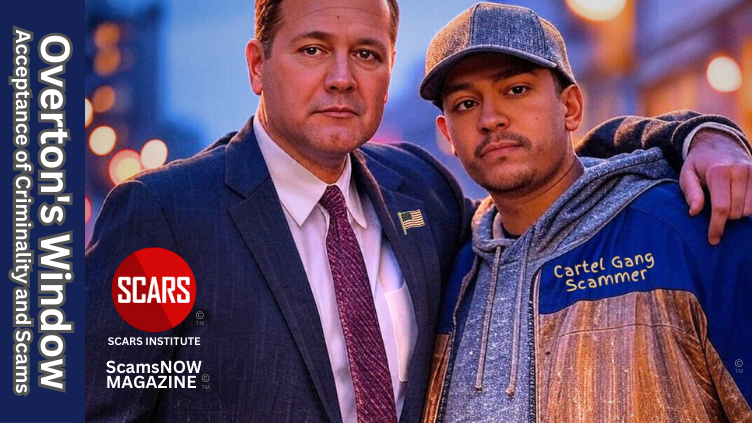Acknowledging The Harm Done
How Scam Victims Can Unwittingly Harm Themselves and Others
Primary Category: Scam Victim Recovery Psychology
Intended Audience: Scam Victims-Survivors / Family & Friends
Author:
• Tim McGuinness, Ph.D. – Anthropologist, Scientist, Director of the Society of Citizens Against Relationship Scams Inc.
• Vianey Gonzalez B.Sc(Psych) – Licensed Psychologist Specialty in Crime Victim Trauma Therapy, Neuropsychologist, Certified Deception Professional, Psychology Advisory Panel & Director of the Society of Citizens Against Relationship Scams Inc.
—
Originally Published on RomanceScamsNOW.com on Jun 19, 2023 – Major Update May 5, 2025
About This Article
Scam victims are often manipulated so thoroughly that they unwittingly engage in behavior that harms both themselves and others. This harm may include lying to family and friends, deceiving financial institutions, concealing financial losses, justifying suspicious behavior, and isolating themselves from their support network. In some cases, victims may even steal shared funds or unknowingly support criminal enterprises through their financial actions. These behaviors, while not malicious, are often driven by fear, shame, and psychological manipulation. Left unacknowledged, they contribute to lingering guilt, relationship breakdowns, and emotional distress that can stall recovery.
Many victims also mistakenly believe that a basic understanding of scams makes them experts, which can lead to the spread of misinformation. To move forward, victims must face the full truth of what happened—both what was done to them and what they did under pressure. Structured support programs, trauma-informed counseling, and education provide essential tools for recovery. By choosing honesty, taking responsibility, and committing to healing, victims can begin to rebuild their lives with clarity and dignity. Recovery is not about blame. It is about truth, courage, and reclaiming personal agency after exploitation. That journey begins with self-awareness and honest action.

How Scam Victims Can Unwittingly Harm Themselves and Others
Understanding the Hidden Harm
Scams and frauds are devious crimes that prey upon unsuspecting individuals, manipulating trust and exploiting vulnerabilities for personal gain. While scam victims are undoubtedly targeted and manipulated by skilled fraudsters, and while it is clear that the blame lies with the criminals, it is also important to recognize the complex dynamics involved. In some cases, victims inadvertently contribute to the harm inflicted upon themselves and others during the course of the crime.
This content explores how scam victims can find themselves entangled in a web of deceit, sometimes causing harm through actions such as lying to loved ones and financial institutions, and unknowingly supporting criminal activities.
A Note to Scam Victims
This is not something to focus on during the early days of recovery. In the first few months after a scam ends, your energy should be focused on understanding your trauma and the details of the crime. But as time passes, lingering guilt and shame related to certain actions may surface. These feelings can become barriers to your emotional recovery and your relationships with those who care about you.
This is a topic covered in the SCARS support and recovery program. It is also something that can be processed in trauma-informed counseling. Many victims are not aware they engaged in harmful behavior because coping mechanisms hide these truths. But in our experience, almost every victim has done some of it. Facing these actions and releasing their hold is essential for your well-being.
Lying to Family and Friends
Family and friends are often secondary victims of scams. In the aftermath, you may struggle with shame, embarrassment, and fear of being judged. This can lead you to hide the truth, which prevents others from understanding what happened or offering support.
During a romance scam, victims can find themselves caught in a web of deception, leading them to lie to their friends and family. One of the most common forms this takes is hiding the relationship altogether. Scammers frequently gaslight their victims into secrecy, warning them that others will not understand or will try to destroy what they claim is a special connection. Victims, under emotional manipulation, often comply with this demand. While it may seem like an omission, it is still a form of deception, especially when it results in estrangement from loved ones who could otherwise provide help.
Another frequent behavior is fabricating key aspects of the relationship. Victims may invent or embellish details about the scammer’s background, profession, or personal circumstances to make the story more plausible and to justify the emotional investment. This is especially common when victims are questioned by skeptical family members. The goal is often self-protection—to avoid embarrassment or challenge—but it increases isolation and perpetuates the fantasy.
Victims may also shut out their family and friends entirely. As the fake relationship deepens, the manipulation becomes more intense, and fear of being exposed pushes victims to sever communication. Some victims will end long-standing relationships with people they love to protect the lie they are living. This abandonment is deeply painful for those left behind and can be a major source of guilt for the victim once the truth comes to light.
Another major behavior is concealing financial losses. Scammers manipulate victims into sending money under a variety of false pretenses, and victims often lie about these transactions. They may claim to be funding a business venture, helping a friend in crisis, or paying off personal debts. Some invent complex stories to explain sudden financial distress, credit card debt, or even the sale of personal belongings. These lies are attempts to preserve dignity and privacy, but they contribute to greater emotional damage over time.
There are even cases where victims steal money. This may sound harsh, but when a victim is married or part of a shared household, spending joint funds without consent is a breach of trust. Some go further, accessing funds from family members’ accounts, refinancing shared property, or even embezzling from their employers. These actions are rarely malicious. They are usually driven by desperation, intense emotional attachment, and psychological manipulation by the scammer. Nevertheless, they carry serious consequences—emotionally, relationally, and legally.
Some victims also justify suspicious behavior to others, especially when asked about questionable transactions or activities. They may say they are investing, helping someone abroad, or involved in charitable work. These lies are not just verbal missteps—they serve to protect the scammer and prolong the harm. Meanwhile, loved ones are left in the dark, confused by the victim’s erratic behavior and worried about what is really happening.
Even when victims begin to notice red flags, they often minimize them. The desire to hold onto hope can lead them to rationalize strange behavior or dismiss the warnings of others. This is particularly dangerous because it reinforces the illusion. When friends or family express concern, victims may become defensive or offer false explanations to preserve the image of the relationship. Like those in abusive domestic relationships, scam victims often protect their abuser out of fear, love, or shame.
Finally, many victims talk about future plans with the scammer—upcoming visits, engagements, marriages, or even joint business ventures. These fantasies are often built from lies told by the scammer but repeated by the victim as if they are real. To friends and family, it appears the victim has either lost touch with reality or is deceiving them. This betrayal of trust can be devastating and creates emotional damage that extends beyond the victim to everyone close to them.
To recover, it is necessary to acknowledge these actions and, where possible, apologize to those affected. Doing so helps to rebuild trust and reduce the emotional burden you carry.
Deception with Financial Institutions
Scammers often convince victims to send money or share personal financial details. In the process, victims may lie to banks or money transfer services, not realizing that doing so can lead to legal complications.
In the course of these interactions, scam victims may find themselves lying to banks or money transfer services—sometimes knowingly, sometimes as a result of confusion or psychological pressure. Regardless of intent, such actions can have legal consequences and significantly increase the victim’s emotional burden.
One common scenario is when a victim certifies a false relationship in order to send money. Money transfer services often include warnings or questionnaires that are designed to detect fraud. For example, they may ask if the sender knows the recipient personally. Victims, determined to help their scammer or convinced of the legitimacy of the relationship, may falsely certify that they know the recipient well. This constitutes misrepresentation, which can be classified as wire fraud or aiding criminal activity.
Providing misleading information on bank forms is another frequent occurrence. Victims may fabricate the purpose of the transaction, label it as a gift, a loan, or a business transaction, when in fact it is none of these. These misstatements may seem harmless in the moment, especially under emotional pressure, but they can become serious issues if the scam is later investigated.
Some victims also give scammers direct access to their financial accounts. This may involve sharing login credentials, enabling remote access, or allowing criminals to move money freely. In doing so, the victim can unknowingly become involved in money laundering. Even if the victim is unaware of the illegality, their participation could attract scrutiny from financial institutions or law enforcement.
Depositing fraudulent checks is another tactic used by scammers. Victims may receive checks from their scammer with instructions to deposit them and send a portion of the money onward. Initially, the funds appear in the account, leading the victim to believe the check is valid. They then transfer funds to the scammer before the check bounces, leaving them financially liable and potentially facing criminal charges for passing bad checks.
Each of these actions—whether driven by trust, desperation, or manipulation—can carry serious consequences. The best course of action, once a victim becomes aware of the scam, is to report it to local law enforcement and include complete financial details. This transparency not only aids the investigation but also helps clear the victim’s name. Full disclosure allows law enforcement and banks to document the criminal activity appropriately and minimizes the chance of further complications.
Taking these steps is not about self-incrimination—it is about reclaiming control and acknowledging what happened. Victims should not feel ashamed of being deceived, but they do have a responsibility to disengage fully and truthfully once they are aware of the scam. It is an important part of the healing process and can serve as a step toward regaining trust, both from others and from oneself.
Unwitting Support of Terrorism
It is estimated that a significant portion of scam revenue funds organized crime and terrorism. By sending money to scammers, victims may unknowingly support these activities.
Even if you were unaware of the connection, understanding the larger impact can help you accept the need for recovery, reporting, and moving forward with integrity.
Not Reporting the Crime
The majority of scam victims never report the crime. Reasons include shame, fear, belief that it will not help, or a desire to hide the experience. However, silence allows the scammers to continue. Choosing not to report is an act of omission that supports their ongoing harm.
By reporting, you fulfill a responsibility to yourself and to others. You do not control what law enforcement does with the report. What matters is that you spoke the truth and removed the weight of secrecy.
Misplaced Confidence in Scam Knowledge
After a scam ends, many victims naturally seek out information to understand what happened. They research online, join forums, and follow social media discussions. In doing so, they begin to accumulate facts, terminology, and common scam patterns. This learning is an important part of early recovery—it can provide validation, comfort, and a sense of control. However, there is a risk that comes with it. Without structured education or formal guidance, it is easy to confuse familiarity with expertise.
Victims who are still emotionally raw may begin to think of themselves as authorities on scams simply because they have gone through one. They may attempt to advise others, interpret laws, or issue warnings based on personal experience rather than proven knowledge. While well-intentioned, this can lead to the spread of misinformation, distorted perceptions of risk, and harmful advice. In some cases, this behavior reflects a coping mechanism—trying to reclaim power after a period of helplessness. But it also risks misleading others and reinforcing personal misconceptions.
It is important to acknowledge that surviving a scam does not automatically make someone a scam expert, just as having surgery does not make someone a surgeon. Scams are complex criminal operations that require a deep understanding of psychology, criminology, cybercrime, and victimology. This level of insight can only come from structured training, long-term study, and experience in working directly with scam victims over time.
To build real expertise and support safe, informed recovery, victims should seek out proper education. The free SCARS Institute Scam Survivor’s School, available at www.SCARSeducation.org, offers a professional, trauma-informed learning environment specifically designed for scam victims. This program helps victims understand how scams work, how psychological manipulation operates, and how to manage the recovery process responsibly. It also teaches victims how to avoid becoming repeat victims or unintentionally harming others through misinformed support.
By enrolling in the FREE SCARS Institute’s Scam Survivor’s School, you gain access to evidence-based guidance, peer-reviewed insights, and practical tools for personal recovery. You also build a solid foundation if you want to become involved in future advocacy or education. Rather than relying on partial knowledge or assumptions, you equip yourself with real information that has the power to heal and help.
Confidence is important in recovery, but confidence without training can become dangerous. The best way to honor your experience is to deepen your understanding through structured learning and professional guidance. That way, you not only protect yourself, but you also learn to protect others as well.
Acknowledging the Victim’s Experience
Scammers use advanced psychological tactics designed to override your natural instincts and exploit your emotional vulnerabilities. These are not random tricks or simple lies. They are part of a calculated and deliberate effort to manipulate your thoughts, feelings, and behaviors over time. Scammers build trust, create emotional dependency, and isolate you from outside voices. They carefully construct stories that appeal to your values, your hopes, and your fears. Their methods are tailored to make you doubt your own judgment and increase your emotional investment in the relationship or transaction.
Recognizing how these tactics work is an important step in understanding what happened. It helps explain why intelligent, capable people become victims. But simply understanding the scam does not undo the harm. You may still be left with lasting damage—financial losses, broken trust, legal complications, and emotional trauma. These outcomes are real, and they carry consequences that affect every part of your life.
The challenge is not just to analyze how you were manipulated, but to come to terms with what followed. You may have lied to people you love. You may have made financial decisions that exposed you or others to risk. You may have participated in actions that now cause you guilt. These are not signs of weakness. They are signs that a sophisticated criminal exploited your humanity.
Acknowledging the depth of your experience means facing both the manipulation and the aftermath. It means being honest with yourself about what occurred, without minimizing or excusing it, but also without falling into self-hatred. Healing starts when you accept that you were targeted, that the crime affected your behavior, and that you are still responsible for choosing recovery now.
This process is not about blame. It is about clarity. By fully acknowledging what happened—both what was done to you and what you did under pressure—you begin to dismantle the shame and silence that often follow scam victimization. That self-honesty is the foundation for personal repair, reconciliation with others, and long-term healing. It also allows you to reclaim your agency and begin making decisions based on your values instead of your trauma.
You can begin to resolve these issues by engaging in structured recovery programs and professional counseling. SCARS provides resources for both at support.AgainstScams.org and counseling.AgainstScams.org.
Moving Toward Recovery
Recovery requires more than understanding that a scam occurred. It involves taking ownership of your response, your healing, and your future.
Acknowledging the ways you may have unknowingly contributed to harm is not about blame. It is about truth. When you face the full reality, you remove the fuel that guilt and shame feed on. You can begin to heal without hiding any part of what happened.
Choosing recovery means choosing responsibility. It means choosing not to repeat the same mistakes, not to live in secrecy, and not to carry burdens that do not belong to you.
Conclusion
If you were the victim of a scam, you may have done things during or after the scam that caused harm to others or to yourself. This does not make you a criminal or a bad person. It makes you someone who was manipulated and hurt. But now you have the opportunity to respond differently.
You can face what happened. You can tell the truth. You can make amends where needed. You can report the crime and help prevent others from being victimized. And you can stop carrying guilt for things you did while in the grip of emotional and psychological manipulation.
There is a way forward. You do not have to be perfect. You just have to be honest. And you have to want to recover. Everything else can grow from there.
Please Rate This Article
Please Leave Us Your Comment
Also, tell us of any topics we might have missed.
Leave a Reply
Thank you for your comment. You may receive an email to follow up. We never share your data with marketers.
-/ 30 /-
What do you think about this?
Please share your thoughts in a comment above!
ARTICLE RATING
TABLE OF CONTENTS
CATEGORIES
MOST POPULAR COMMENTED ARTICLES
POPULAR ARTICLES
U.S. & Canada Suicide Lifeline 988
![NavyLogo@4x-81[1]](https://scamsnow.com/wp-content/uploads/2025/04/NavyLogo@4x-811.png)
ARTICLE META
WHAT PEOPLE ARE TALKING ABOUT LATEST SITE COMMENTS
See Comments for this Article at the Bottom of the Page
on Arts and Crafts Can Significantly Aid in Recovery for Scam Victims – 2025: “I did not realize that things I like doing very much—knitting or sudoku—were so helpful in my recovery process. The…” Jul 14, 11:28
on Projection And Scam Victims: “The moment I realized I had a financial loss due to a scam I realized that I felt shame, guilt,…” Jul 13, 19:12
on Japanese Legend of Tears – When There Are No Words – 2025: “After discovering the fraud, the pain was enormous. I shed oceans of tears, but I always tried to do it…” Jul 13, 10:50
on The SCARS Institute Scam Victim Recovery Timeline – 2025: “Wow. I umm experienced some of the later curves. I have been bouncing back and forth between asking myself why…” Jul 11, 00:01
on Transference And Emotional Danger After The Scam – 2024: “Thank you for the kind but firm reminder that the person in the stolen profile photo has their own life.…” Jul 9, 01:26
on ‘Mental Defeat’ – The Unique Condition Of Giving Up – 2024: “Thank you for another great article. I can see from this article that mental defeat would be debilitating to a…” Jul 9, 00:49
on Trust: Romance Scams Betrayal And Scam Victims – 2024: “This provided valuable insight that I can identify with” Jul 8, 16:44
on A Scam Victim in Extreme Distress – Stopping the Pain – 2024: “Your trust issues are very understandable. We are very sorry this happened to you. We suggest that you contact an…” Jul 8, 14:42
on A Scam Victim in Extreme Distress – Stopping the Pain – 2024: “My online counselors advised me to check myself in. I went to the hospital because I was suicidal. After I…” Jul 8, 13:44
on Scam Victim Catastrophizing Making Recovery Difficult 2024: “Excellent article on catastrophizing. I can understand how this could take a person down a rabbit warren of never ending…” Jul 8, 12:12
on The Self-Pity Trap & How To Overcome It – 2023 – [UPDATED 2025]: “I am not in the habit of feeling sorry for myself. After the deception, although it was not easy at…” Jul 8, 11:49
on Pride – A Dual Edged Sword For Scam Victims – 2023 [UPDATD 2024]: “Looking back over my life I have seen how pride has impacted me both positively and negatively. However the negative…” Jul 8, 09:08
on The Self-Pity Trap & How To Overcome It – 2023 – [UPDATED 2025]: “I felt self-pity while the enormity of my financial loss washed over me like a tsunami. The self-pity lasted only…” Jul 7, 18:55
on The Uniqueness Of Scam Victims Or Fraud Victims – 2024: “unfortunately all true. It is highly stressful dealing with the aftermath. I am being sued for the money I borrowed…” Jul 6, 12:50
on Scam Victims & Mental Health Blaming – 2023 [UPDATED 2025]: “For most of my life words have defeated me, made me feel insignificant, unwanted, unneeded. For this reason it is…” Jul 5, 13:36
on Substance Abuse Susceptibility And Scam Victims – 2024: “It is understandable how some would feel that alcohol or substance abuse would be helpful in handling their feelings after…” Jul 1, 20:36
on Scam Victims Use Work To Avoid Healing: “The last 6 years have been the most difficult of my life. The pandemic, having both parents in the hospital…” Jun 29, 18:38
on Entitlement Mentality And How Scam Victims Often Lose Their Path To Recovery – 2024: “Thank you for this discussion of entitlement. I can see from the descriptions listed that I have not felt entitlement.…” Jun 29, 18:22
on Samurai Wisdom and Rituals for Clearing the Mind After Scam Trauma – 2025 – [VIDEOS]: “A great guide on how to move forward in our recovery process with a calm mind, cleansed on an ongoing…” Jun 28, 07:34
Important Information for New Scam Victims
Please visit www.ScamVictimsSupport.org – a SCARS Website for New Scam Victims & Sextortion Victims
SCARS Institute now offers a free recovery program at www.SCARSeducation.org
Please visit www.ScamPsychology.org – to more fully understand the psychological concepts involved in scams and scam victim recovery
If you are looking for local trauma counselors, please visit counseling.AgainstScams.org
If you need to speak with someone now, you can dial 988 or find phone numbers for crisis hotlines all around the world here: www.opencounseling.com/suicide-hotlines
Statement About Victim Blaming
Some of our articles discuss various aspects of victims. This is both about better understanding victims (the science of victimology) and their behaviors and psychology. This helps us to educate victims/survivors about why these crimes happened and not to blame themselves, better develop recovery programs, and help victims avoid scams in the future. At times, this may sound like blaming the victim, but it does not blame scam victims; we are simply explaining the hows and whys of the experience victims have.
These articles, about the Psychology of Scams or Victim Psychology – meaning that all humans have psychological or cognitive characteristics in common that can either be exploited or work against us – help us all to understand the unique challenges victims face before, during, and after scams, fraud, or cybercrimes. These sometimes talk about some of the vulnerabilities the scammers exploit. Victims rarely have control of them or are even aware of them, until something like a scam happens, and then they can learn how their mind works and how to overcome these mechanisms.
Articles like these help victims and others understand these processes and how to help prevent them from being exploited again or to help them recover more easily by understanding their post-scam behaviors. Learn more about the Psychology of Scams at www.ScamPsychology.org
SCARS INSTITUTE RESOURCES:
If You Have Been Victimized By A Scam Or Cybercrime
♦ If you are a victim of scams, go to www.ScamVictimsSupport.org for real knowledge and help
♦ Enroll in SCARS Scam Survivor’s School now at www.SCARSeducation.org
♦ To report criminals, visit https://reporting.AgainstScams.org – we will NEVER give your data to money recovery companies like some do!
♦ Follow us and find our podcasts, webinars, and helpful videos on YouTube: https://www.youtube.com/@RomancescamsNowcom
♦ Learn about the Psychology of Scams at www.ScamPsychology.org
♦ Dig deeper into the reality of scams, fraud, and cybercrime at www.ScamsNOW.com and www.RomanceScamsNOW.com
♦ Scam Survivor’s Stories: www.ScamSurvivorStories.org
♦ For Scam Victim Advocates visit www.ScamVictimsAdvocates.org
♦ See more scammer photos on www.ScammerPhotos.com
You can also find the SCARS Institute on Facebook, Instagram, X, LinkedIn, and TruthSocial
Psychology Disclaimer:
All articles about psychology and the human brain on this website are for information & education only
The information provided in this and other SCARS articles are intended for educational and self-help purposes only and should not be construed as a substitute for professional therapy or counseling.
Note about Mindfulness: Mindfulness practices have the potential to create psychological distress for some individuals. Please consult a mental health professional or experienced meditation instructor for guidance should you encounter difficulties.
While any self-help techniques outlined herein may be beneficial for scam victims seeking to recover from their experience and move towards recovery, it is important to consult with a qualified mental health professional before initiating any course of action. Each individual’s experience and needs are unique, and what works for one person may not be suitable for another.
Additionally, any approach may not be appropriate for individuals with certain pre-existing mental health conditions or trauma histories. It is advisable to seek guidance from a licensed therapist or counselor who can provide personalized support, guidance, and treatment tailored to your specific needs.
If you are experiencing significant distress or emotional difficulties related to a scam or other traumatic event, please consult your doctor or mental health provider for appropriate care and support.
Also read our SCARS Institute Statement about Professional Care for Scam Victims – click here
If you are in crisis, feeling desperate, or in despair, please call 988 or your local crisis hotline.
More ScamsNOW.com Articles
A Question of Trust
At the SCARS Institute, we invite you to do your own research on the topics we speak about and publish. Our team investigates the subject being discussed, especially when it comes to understanding the scam victims-survivors’ experience. You can do Google searches, but in many cases, you will have to wade through scientific papers and studies. However, remember that biases and perspectives matter and influence the outcome. Regardless, we encourage you to explore these topics as thoroughly as you can for your own awareness.
















![scars-institute[1]](https://scamsnow.com/wp-content/uploads/2025/04/scars-institute1.png)
![niprc1.png1_-150×1501-1[1]](https://scamsnow.com/wp-content/uploads/2025/04/niprc1.png1_-150x1501-11.webp)

Thank you. The choice to recover, heal and be you again, lies with you. Grab the wonderful opportunity SCARS makes available – it is so worth it.